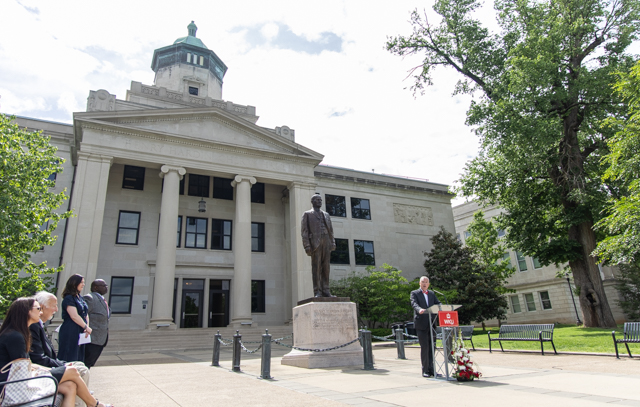Ten at FOP’s forum
Published 12:00 am Friday, September 15, 2006

- Photo by Miranda Pederson/Daily NewsFamily court judge candidates (from left) Joy Denton, Osi Onyekwuluje, Catherine Holderfield and Dixie Satterfield wait their turn to address the crowd Thursday at the FOP Lodge No. 13.
Ten candidates for two local offices introduced themselves and answered questions Thursday night at a forum sponsored by the Fraternal Order of Police Lodge 13.
Candidates for Bowling Green City Commission and Warren Family Court, division four, spoke; a similar forum last week at the lodge gave the stage to candidates for county offices.
Lodge President Shawn Helbig, a Bowling Green police officer, told the candidates that local officers will hold politicians accountable for their campaign promises; the forum was being taped.
The four candidates for family court judge each gave brief statements, but were asked no questions.
Joy Denton described family court as frequently being the last resort for families, and said that people who appear there must be able to expect a fair, full hearing.
“The only preconceived notion that we can have in family court is that the best interest of the child must prevail,” she said.
Incumbent Judge Catherine Holderfield said she’s the youngest candidate, but also the most experienced, trying more than 630 cases before she took the bench and holding 4,200 hearings since then.
Osi Onyekwuluje said that all four candidates have enough experience to do the job, but his sensitivity to fairness is what sets him apart. Many people consider the court system to be biased, but he’s experienced great unfairness in his life, so he won’t treat anyone else that way, Onyekwuluje said.
Dixie Satterfield said that for most of the 1970s, he was a police judge pro tempore and served as city prosecutor. Those positions no longer exist. In his 37 years as an attorney, he defended local police in excessive force and wrongful arrest cases, and gained substantial experience in family law, he said.
Six of the eight commission candidates were present; Joe Denning did not attend, and Helbig said he had been unable to get in touch with Edmond Schwab Jr. despite repeated tries.
Commissioner Delane Simpson said the current commission faced many problems when elected in 2004; some they knew, like mismanagement of the Sloan Convention Center, and some they didn’t, like 20 years of embezzlement by former city Chief Financial Officer Davis Cooper.
Commissioners “fixed” the convention center management, and recovered some money from its longtime secretary, Steve Catron, Simpson said – about $150,000 was netted – and the city is still pursuing further reimbursement from Cooper’s theft, he said. About $1 million has been recovered of an estimated $4 million Cooper stole.
This commission negotiated a new site for LifeSkills’ headquarters, keeping those jobs local, Simpson said.
Other commissioners asked longtime City Manager Chuck Coates to retire in April 2005. “The process by which that happened just did not sit right with me,” Simpson said.
Commissioners required prepayment at gas stations within the city, a move that police requested to prevent drive-offs, he said.
Donna Renaud, who teaches communications at Western Kentucky University, said she moved to Bowling Green in 1978 to become a Kentucky State Police dispatcher, before enrolling in Western.
During a recent ride-along with city police, she found it “pretty insane” that only eight officers patrolled the city at night, she said. Renaud said that police should have “a place at the table” whenever the city is discussing police-related matters.
Bruce Wilkerson retired with 20 years experience in law enforcement, two with Western’s police and 18 on Bowling Green’s force. Three times in that period police went without annual pay raises, so he’s concerned about public safety pay, he said. In the city pay plan approved this year, Wilkerson said, he was unhappy that City Manager Kevin DeFebbo did not hold group discussions with officers while putting together the plan.
Commissioner Brian “Slim” Nash agreed that the current commission walked into many tough issues. But he’s enjoyed dealing with them, and wants to continue. To some issues, there is no solution that will make everyone happy, but he’s always willing to listen and discuss others’ views, Nash said.
Commissioner Brian Strow said he came onto the commission with three issues: restoring open decision-making, cutting the occupational tax and increasing fiscal responsibility.
Commissioners instituted public work sessions to discuss upcoming issues, held unprecedented detailed budget hearings – and, at his urging, voted to cut the occupational tax beginning Jan. 1, he said.
“My focus has been and will continue to be getting back to basics with city money,” Strow said. He and Nash, after meeting with police officers, put together a modified version of DeFebbo’s pay plan that adjusted public safety pay, Strow said.
Mark Bradford said commissioners should work on improving traffic downtown, perhaps by widening 12th Avenue. More downtown parking could be created by moving the post office, finding a new site through eminent domain if necessary, he said.
After candidates’ opening statements, Helbig asked questions sent up by FOP members.
In response, all candidates said they were at least tentatively in favor of allowing collective bargaining for police, though Simpson and Bradford said they needed more information. Renaud said that a city resolution to that effect could be easily repealed, and suggested seeking statewide authorization through the General Assembly.
Helbig said state troopers are likely to get a large starting pay raise, which would make their jobs pay much more than city police make. If that happens, he asked, would commissioners support raising city police pay to keep from losing trained officers to KSP?
Simpson said he’s confident the commission would come up with some sort of incentive to keep city officers. Renaud said that “professionals should be paid professionally.” Wilkerson and Nash agreed that police should be well-compensated, and that their pay is always subject to change.
Strow said city police pay is linked to comparable pay for firefighters, and that he thinks that direct correspondence should be broken. Bradford said he was concerned about deficit spending, but that police should always be a priority.
Helbig went back to the parity between police and firefighters’ pay, saying that firefighters have more than twice as many chances for promotion – and therefore higher pay – as police. Some police officers can spend 20 years on the job without a reasonable opportunity for promotion, he said, asking if the candidates would support increasing the number of positions to which police officers could be promoted.
Simpson said he’d like to see officers’ proposals on restructuring the system. Renaud said she was open to the discussion, as did Wilkerson and Nash. Strow reiterated that he doesn’t think the police-fire pay parity should be maintained, and Bradford said he would probably approve increasing police ranks and/or cutting fire department positions.
Helbig asked their opinions on how insurance costs should be split between the city and its employees.
Simpson said he’s willing to discuss it, but since medical costs are inexorably rising for everyone, he doesn’t think employee premiums can go down. Renaud said she needed more details, but didn’t want to see employee costs rise to “break the back of the working people.”
Wilkerson said he sat through all the city’s public insurance discussions this year, and still doesn’t understand it – except to grasp that employees are paying more. It used to be the benefit package that brought police to work here, he said.
Nash said he knows what it’s like to be on the losing end of insurance rate hikes, but that everyone has to share rising costs; and that he must justify to taxpayers whatever benefits deal city employees receive.
Strow said he considers pay and benefits to be the same issue; the city must be competitive with its whole package, but he too has to tell taxpayers – some of whom don’t have insurance at all – why city employees get benefits better than most in the private sector. Bradford said the city should work on incentives to cut insurance use to keep costs down.
Finally, Helbig asked whether the candidates would honor the tacit agreement made last year that officers on street patrol would keep rear-wheel-drive Ford Crown Victorias – the officers’ near-unanimous choice – or be made to drive smaller, front-wheel-drive General Motors cars.
Simpson said safety is his biggest concern, and that includes accounting for officers’ preferences and comfort. Renaud said she saw how cramped the Chevrolet Impala can be during her recent ride-along, when it’s packed with police equipment, and so she supports Crown Victorias.
Wilkerson and Nash agreed that police should have their choice, the larger rear-wheel-drive Crown Victoria. Nash joined them, and Bradford said police had made a compelling argument for keeping the Fords on street patrol.






